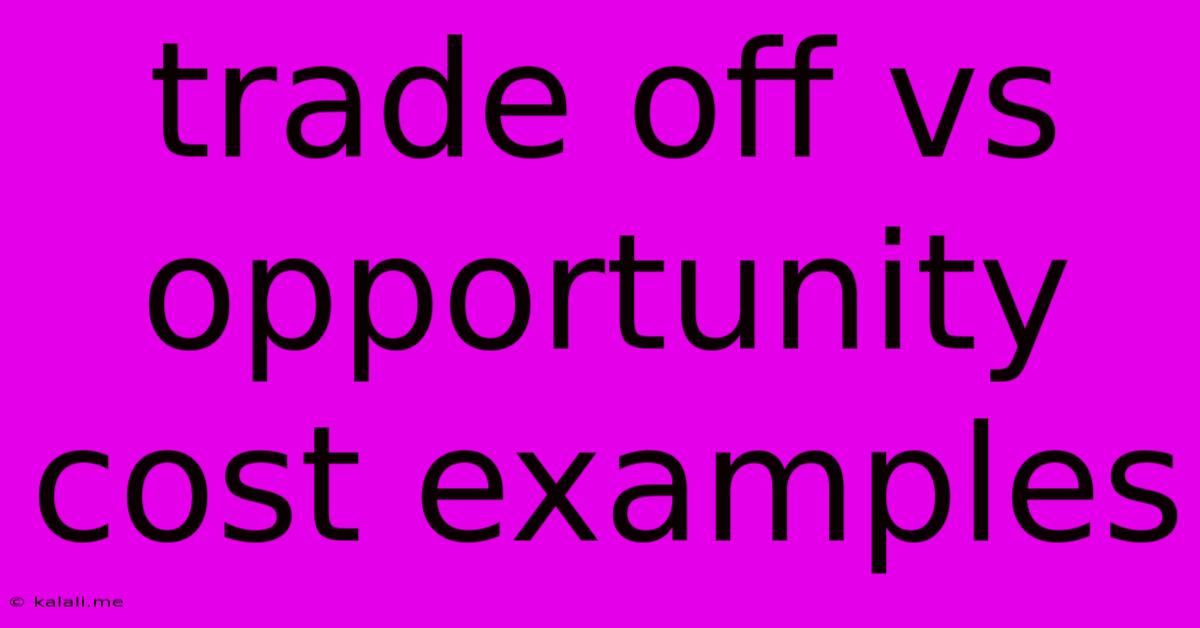Trade Off Vs Opportunity Cost Examples
Kalali
Jun 12, 2025 · 3 min read

Table of Contents
Trade-Offs vs. Opportunity Costs: Understanding the Difference
Choosing between two desirable options is a common dilemma. Often, the terms "trade-off" and "opportunity cost" are used interchangeably, leading to confusion. However, while closely related, they represent distinct economic concepts. This article will clarify the difference between trade-offs and opportunity costs, providing clear examples to solidify your understanding. Understanding these concepts is crucial for making informed decisions in various aspects of life, from personal finance to business strategy.
What is a Trade-Off?
A trade-off simply involves choosing one option over another. It acknowledges that every decision involves sacrificing something. This sacrifice isn't necessarily a negative thing; it's a conscious choice between competing alternatives. The key characteristic of a trade-off is the conscious decision-making process. You are weighing the pros and cons of different choices and deliberately selecting one.
Examples of Trade-Offs:
- Choosing between a career and family: A person might choose a high-paying job that requires long hours, trading off valuable family time. This is a trade-off because it involves a conscious decision to prioritize one aspect of life over another.
- Saving versus spending: Deciding to save money for a down payment on a house means foregoing immediate gratification like a new car or vacation. This conscious choice represents a trade-off.
- Investing in education versus entering the workforce immediately: Choosing to pursue higher education means delaying entry into the workforce and potentially foregoing immediate income. This is a clear trade-off with long-term benefits.
- Choosing between two job offers: A job seeker might choose a job with better benefits but lower salary over a job with higher salary but fewer benefits. This illustrates the selection between competing options which is the definition of a trade-off.
What is Opportunity Cost?
Opportunity cost is the value of the best alternative forgone when making a decision. It's not just about what you give up; it's specifically about the most valuable thing you give up. This is often more subtle and requires careful consideration.
Examples of Opportunity Costs:
- Choosing to go to college: The opportunity cost of attending college isn't just the tuition fees; it's also the potential income you could have earned if you had entered the workforce directly. If you could have earned $50,000 a year working, and you spent four years in college, your opportunity cost is potentially $200,000 (excluding tuition and other expenses).
- Investing in stocks: The opportunity cost of investing in stocks could be the potential returns you could have achieved by investing in real estate or bonds. You must consider the best alternative investment you could have chosen.
- Starting a business: The opportunity cost of starting your own business is the salary you could have earned working for someone else, the potential returns from another investment, or the value of your time spent pursuing the venture.
The Key Difference:
The crucial distinction lies in the focus:
- Trade-offs are about the conscious act of choosing between alternatives.
- Opportunity cost is the value of the single best alternative that was sacrificed.
Every trade-off has an opportunity cost, but not every opportunity cost involves a conscious trade-off. You might unconsciously make a choice without fully understanding all the potential opportunities you're missing.
In Conclusion:
Understanding the difference between trade-offs and opportunity costs is essential for effective decision-making. While trade-offs represent the conscious selection between options, opportunity cost focuses on the value of the best alternative forgone. By carefully considering both concepts, individuals and businesses can make more informed choices that align with their goals and maximize their overall well-being. Analyzing opportunity costs helps to assess the true cost of any decision, preventing regrettable choices in the long run.
Latest Posts
Latest Posts
-
Write The Negation Of The Statement
Jun 13, 2025
-
Which Of The Following Is An Acid
Jun 13, 2025
-
What Is The Second Most Abundant Gas On Earth
Jun 13, 2025
-
Cluster Of Capillaries In A Nephron Term
Jun 13, 2025
-
Is Mediterranean Agriculture Commercial Or Subsistence
Jun 13, 2025
Related Post
Thank you for visiting our website which covers about Trade Off Vs Opportunity Cost Examples . We hope the information provided has been useful to you. Feel free to contact us if you have any questions or need further assistance. See you next time and don't miss to bookmark.